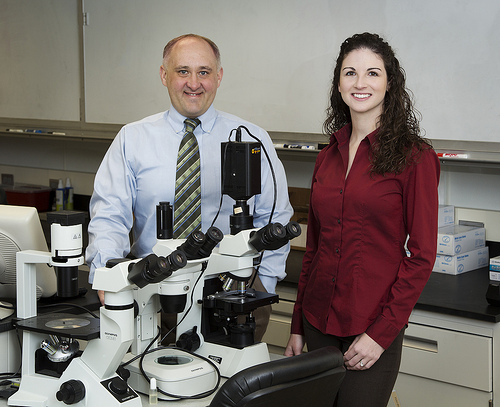CHEMISTRY
Oklahoma State receives Phase II Grand Challenges Explorations funding

Oklahoma State University has received Phase II funding through Grand Challenges Explorations, an initiative created by the Bill & Melinda Gates Foundation that enables individuals worldwide to test bold ideas to address persistent health and development challenges.
Drs. Gary Foutch, AJ Johannes and Jim Smay of the chemical engineering department along with Dr. Mason Reichard of the OSU Center for Veterinary Health Sciences will continue to pursue an innovative global health research project, titled "Shear Extrusion to Treat Fecal Waste." They will be assisted by Jennifer Thomas, a postdoctoral student from CVHS, and Md Waliul Islam and Jagdeep Podichetty, chemical engineering graduate students.
"In Phase I we documented that extrusion technology could be effective in sanitizing fecal wastes," Foutch said. "In Phase II the Gates Foundation has asked us to confirm that the technology can destroy Ascaris, also known as giant round worm, which affects about one quarter of the world's population."
In 2011, Foutch and Johannes were awarded a Phase I grant for "Simple Treatment of Fecal Waste." They have since added Smay and Reichard to the team. Grand Challenges Explorations (GCE) Phase II grants recognize successful projects with further funding to test concepts from Phase I.
These grants seek to engage individuals worldwide who can apply innovative approaches to some of the world's toughest and persistent global health and development challenges. GCE invests in early stage ideas that have the potential to help bring people out of poverty and realize their human potential.
During Phase I, Foutch and Johannes developed a small-scale device that can effectively disinfect and dewater feces and other solid wastes. The device results in less surface and ground water contamination and reduces the associated spread of disease agents. Other benefits include odor reduction and less attraction to insects.
In Phase II, Foutch, Johannes and colleagues will develop and field test a next-generation stand-alone extruder that can effectively sanitize different types of solid sludge in the field, and is also capable of water recovery via evaporation. They will also design a sanitation module from their extruder that can be incorporated into the Omni-Ingestor technology, which is a modular system that combines sanitation with waste removal and transportation.
